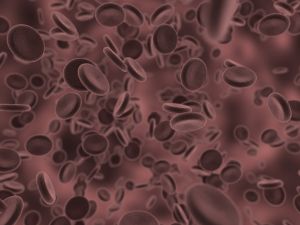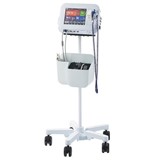An experimental gene therapy technique boosted the production of a vital blood clotting factor in six people with hemophilia B, according to new research supported by the National Institutes of Health.
The therapy could give patients a long-term solution for preventing prolonged bleeding episodes and spontaneous bleeding.
People with hemophilia bleed more following trauma than people without the disease, and those with severe disease may bleed spontaneously. Hemophilia B patients are unable to produce enough human clotting factor IX, also referred to as FIX, which is essential for normal blood clotting. Liver cells are the only cells in the body capable of producing a form of factor IX that is active in the clotting process.
The study, funded in part by the NIH’s National Heart, Lung, and Blood Institute (NHLBI), involved researchers joining the FIX gene to a virus that targets liver cells. This allowed the normal FIX gene to be delivered using intravenous infusion to the liver cells of patients with hemophilia B.
The infusion allowed the patients to produce more FIX. The results will appear online Dec. 10 in the New England Journal of Medicine and in the Dec. 22 print edition. The paper will also be presented on Sunday, Dec. 11 at 2 p.m. PST at the American Society of Hematology’s annual meeting in San Diego.
"Hemophilia has long been one of the disorders thought most likely to be correctible with gene therapy, but previous approaches to deliver the gene have been disappointing. Results from this study represent a promising step toward making gene therapy a viable treatment option for hemophilia B," said Susan B. Shurin, M.D., acting director of the NHLBI. "If future studies support these findings, it would bring a significant improvement in the quality of life for those living with the disease."
Researchers from the University College London Cancer Institute, and St. Jude Children’s Research Hospital, Memphis, Tenn., led a team that examined the effects of delivering the FIX gene to patients. Scientists inserted the FIX gene into a virus, which served as the delivery vehicle for the gene therapy.
The researchers studied six people with severe hemophilia B who were producing clotting factor IX at less than 1 percent of normal levels before receiving the gene therapy. Prior to enrolling in the study, participants were receiving the standard treatment for severe hemophilia B of infusions of manufactured FIX several times a month.
The FIX gene was packaged in a modified adeno-associated virus, AAV8, which targets liver cells. After receiving the FIX gene therapy, each participant produced FIX at between 2 and 11 percent of normal levels. In the short-term follow-up period (six to 16 months), four of the six participants no longer required FIX infusions for routine bleeding. The other two participants required FIX infusions less frequently than before the study.
The unique feature of this approach is the use of AAV8 to deliver the gene to the appropriate cells. If future studies show that immunologic or other factors do not limit its long-term effectiveness, people with hemophilia B could produce their own FIX and potentially avoid reliance upon FIX infusions. While more work is needed, these results are more promising than prior attempts at gene therapy for the hemophilias.
Hemophilia B is less common than hemophilia A, a deficiency of clotting factor VIII. About 1 in 5 hemophilia patients has hemophilia B, while the other four have hemophilia A. Hemophilia is an inherited condition that affects men more frequently. Worldwide, about 1 in 5,000 men are born with hemophilia A and 1 in 25,000 men are born with hemophilia B each year.
Organisations in the United Kingdom that provided funding for this research included: the National Health Service; the National Institute for Health Research; the Department of Health; and the Royal Free Hospital. Funding sources in the United States included: the Howard Hughes Medical Institute; the ASSISI Foundation of Memphis; and the American Lebanese Syrian Associated Charities.


























